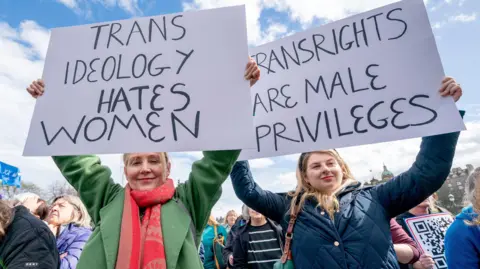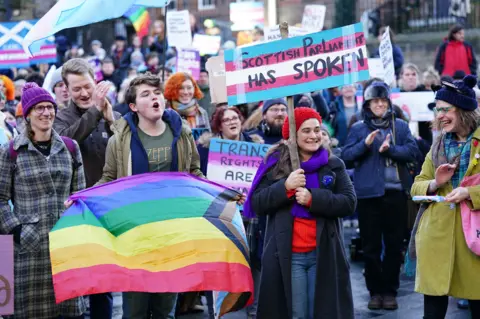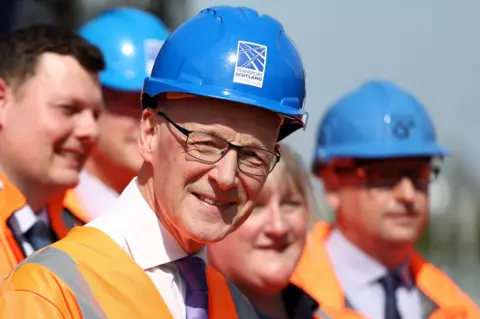How will John Swinney navigate divisions over identity politics?
 PA Media
PA MediaIdentity politics have proven divisive in the SNP and across the Scottish Parliament. Navigating the issue is one of the major challenges facing Scotland's new first minister.
Both of John Swinney's predecessors, Nicola Sturgeon and Humza Yousaf, spent much political capital in this area.
Ms Sturgeon pursued controversial gender recognition reform legislation, and Mr Yousaf persevered with a subsequent legal challenge after the UK government blocked the new laws.
So far, Mr Swinney has been cautious, saying he will "wait and see" what the political landscape is like after the general election when it comes to pursuing gender recognition.
He has described the Cass review into gender identity services for children as a "significant piece of work" on a "complex area of policy" that should be taken seriously.
He says the Scottish government is committed to legislating on conversion therapy but must now reflect carefully on the responses to a recent consultation on the proposals.
But there is one particularly ideologically and politically-loaded question that's hard for today's politicians to avoid giving a definitive answer.
Nicola Sturgeon previously refused to be drawn and Mr Swinney himself avoided answering it during his leadership campaign launch.
But asked on the BBC's Good Morning Scotland programme if a transwoman is a woman, Mr Swinney ventured: "I believe a woman is an adult female born as a woman, and I also accept that transgender women are defined as women."
His response is unlikely to be satisfactory to either side of the debate - and, with his answer being described by some as confusing, it's likely the FM will face further exploration of his views on this topic.
Eventually Mr Swinney will also have to spell out his government's position on gender policies - and deal with the consequences.
 PA Media
PA MediaHe may hope that by then the general election will have been and gone - an event that marks another major challenge for his premiership.
That challenge is not just about delivering a strong election result in itself but also defining what that result means for the SNP's core aim - Scottish independence.
His strategy is to demonstrate he can deliver a thriving Scottish economy and good public services as a means of convincing more Scots of the case for leaving the union.
But he's also committed to the SNP's policy that winning a majority of seat at the forthcoming election would be a mandate for another push on independence.
What happens if they don't get that majority? The first minister won't countenance that right now but it could have a considerable impact on his own future, as well as that of the independence movement.
 PA Media
PA MediaMr Swinney has already made it clear that economic growth is one of his top priorities - and a visit to the ground-breaking for the new Ardersier Port is very much on message.
The project exemplifies investment in the transition from oil and gas to renewables, with government funding boosting private investment.
In that Good Morning Scotland interview, Mr Swinney said: "I want to make sure that the power of government, which is very significant if aligned properly and aligned effectively, can deliver those approaches that are good and attractive for investors."
The focus on growth may be music to the ears of the business community but questions remain over exactly how the first minister intends to alter the Scottish government's current approach.
And the devil, as always, is in the detail. Setting that out is another of his major challenges.
Will he address concerns over business rates?
Will ministers look again at tax policy after the Scottish regime was described as "bewildering" by the entrepreneur Sir Tom Hunter?
And will the current presumption against new oil and gas projects continue?
The answers to those questions remain unclear.
